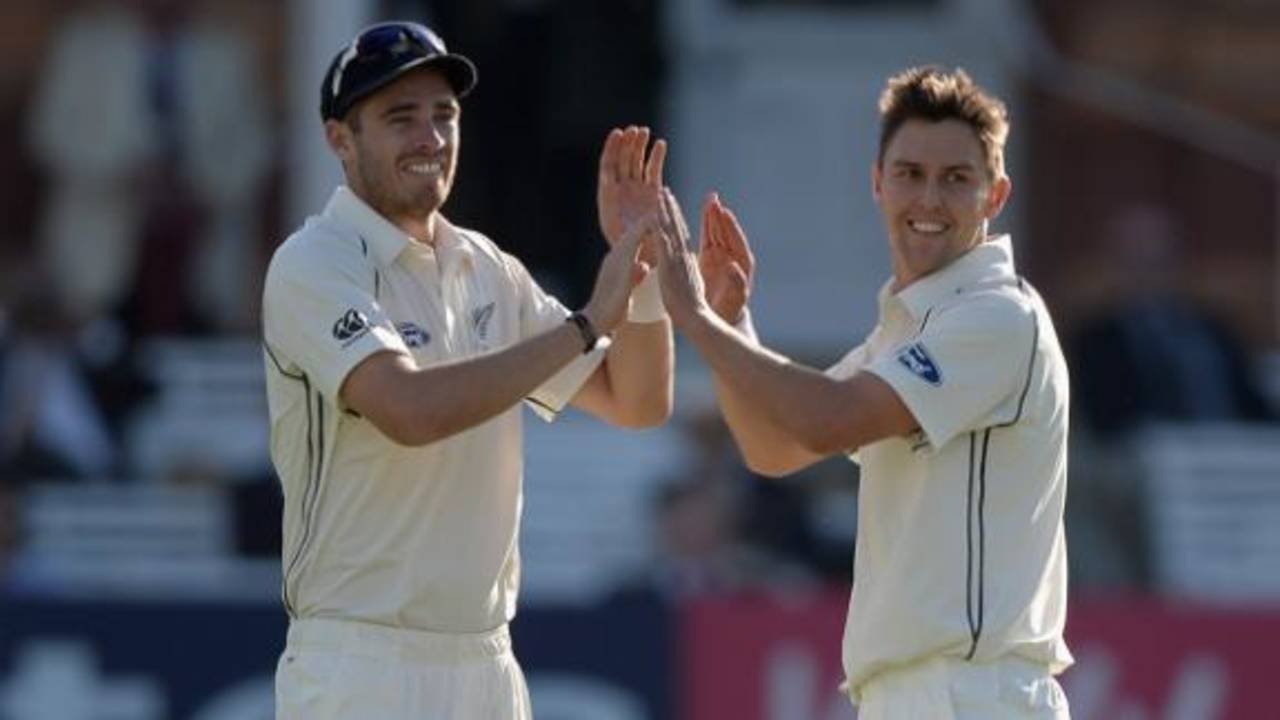Williamson and new-ball duo NZ's best-ever - Hadlee
Sir Richard Hadlee believes New Zealand are entering this three-Test series against Australia with their finest-ever new-ball combination: Trent Boult and Tim Southee
Brydon Coverdale in Brisbane
04-Nov-2015
When New Zealand last won a Test series in Australia, in 1985, the country's all-time greatest cricketer, Sir Richard Hadlee, was the difference. Thirty years on, Hadlee believes New Zealand are entering this three-Test series with not only their finest-ever new-ball combination - Trent Boult and Tim Southee - but also the man who will come to be regarded as New Zealand's best batsman of all time, Kane Williamson.
They are significant words from the most important figure in New Zealand's cricket history. They are also pretty hard words to argue with. All three men were junior members of the side that beat Australia in Hobart in 2011 in the last Test between the nations, and they are key reasons why this could be New Zealand's best chance for a series win in Australia since Hadlee's era.
Hadlee made similar comments about Boult and Southee during this year's World Cup, and with the red ball both men are also near the peak of their powers. Both are 26, both swing the ball both ways, and both are in New Zealand's top eight wicket-takers of all time. The left-right new-ball combination will test Australia's changing top order in helpful Gabba conditions.
"I think I can confidently stand here and say without doubt that that combination will be, if it's not already, the most successful bowling combination in the history of New Zealand cricket," Hadlee said on Wednesday. "To work in tandem as they do, they will put a lot of pressure on any batting line-up, anywhere in the world in any conditions."
It is not just with the swinging ball that New Zealand will threaten Australia. Williamson is the fulcrum of the New Zealand batting line-up, having joined Don Bradman, Garfield Sobers, Sachin Tendulkar, Graeme Smith and Neil Harvey as the only men to have 10 Test centuries before the age of 25. But there is damaging potential throughout their batting order.
"I think Kane Williamson will be our best ever batsman by the time he finishes his career," Hadlee said. "The fact that by this stage he's scored ten Test centuries at 24 years of age, and in the history of the game only six players have scored ten Test centuries by the age of 25. That includes the likes of Sir Donald Bradman, Sir Garfield Sobers and Sachin Tendulkar. So he's in very good company.
"Technically [he's] very good, he just has a desire to occupy the crease and score runs. Taylor is a fine batsman averaging 45, McCullum can be very destructive, and you can't underestimate the likes of BJ Watling, the New Zealand wicketkeeper-batsman, who is averaging 40 himself. Neesham is averaging 43.
"When you look at the run-making potential in the side, they can put runs on the board and you've got bowlers who can get wickets. This is a very capable side, it's a confident side, and they're playing a good, bright, brand of cricket. Attacking, entertaining, and at times high risk, but that can bring great rewards as well. It's a very, very good side."
Hadlee said he expected McCullum to pile the pressure on to Australia's newer players, including Joe Burns and Usman Khawaja, but he stopped short of declaring New Zealand favourites. When Hadlee claimed match figures of 15 for 123 at the Gabba in 1985, New Zealand won the toss and bowled in humid conditions on what he called a "frisky" pitch.
"It is difficult to win here," he said. "We've only won three Test matches in our history here in Australia - the Gabba here in 1985, then Perth in '85, and then four years ago in Hobart, where Doug Bracewell got his career-best of 6 for 40. It is difficult to win here, simply because you're playing Australia in Australia, conditions vastly different here than what they are in New Zealand.
"Hopefully these guys can take some lessons from what went on in the past and the bowlers get in there and get their lines and their lengths right and not go searching. If you go searching and you miss your target you concede runs. Good old-fashioned basic fast bowling … That hasn't changed in the history of the game. If you put the ball in the right place and do a bit with it, you're going to challenge batsmen and batsmen can make mistakes."
Brydon Coverdale is an assistant editor at ESPNcricinfo. @brydoncoverdale
